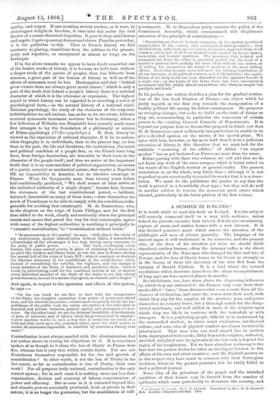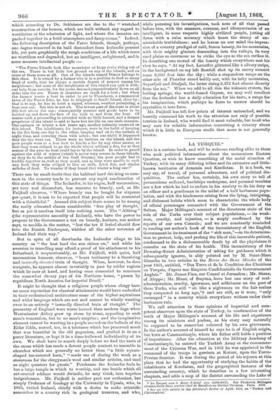A SUMMER IN ICELAND.*
Jr is worth while to read this book on Iceland. Yet the subject will scarcely commend itself to a very wide audience, unless indeed the present excessive heat invests Jiikulls (ice mountains), regions of snow, and sunless houses with a new interest. It is true Iceland possesses much which arrests the attention of the philologist and men of science generally. The language of its ancient sagas is still understood in its nurseries, and the peasant who, at the door of his cheerless (or what we should think cheerless) earthen burrow, offers the stranger coffee is the direct representative of the Norsemen who changed the face and fate of Europe, and the love of liberty burns in his breast as strongly as in the bosom of those old ancestors of his who fled from the tyranny of Harald Fairhair. It is a land where the natural revolutions which elsewhere have been the silent accomplishment of long ages are here enacted almost in months.
Its inhabitants, too, have risen above the depressing influences by which they are surrounded ; the farmers may come from their smoke-filled " bmrs," from distances that seem remote from all the chances of civilization, and enter the towns with their wool, with which they pay for the supplies of the previous year, and prove themselves no country boors, but a thorough match for the sharp- witted merchants, and well skilled in most of the subjects upon which they are likely to converse with the townsfolk or with strangers. It is a perplexing people, difficult to be understood by the untravelled student, in whose mind civilization, intellectual culture, and some idea of physical comfort arc almost inextricably intertwined. That men who can read should live in earthen huts, impregnated with smoke, filthy beyond description, uufloored, unceiled, unlighted save by apertures in the low roof, is beyond the region of his imagination. Yet we have abundant testimony to the fact that the poorest Icelander takes an intelligent interest in the affairs of his own and other countries, and Mr. Paijkull assures us in this respect they have much in common with their Norwegian brethren, where in the poorest peasant's hut be rarely failed to find a political journal. Some idea of the privations of the people and the wretched condition of their houses may be formed from the number of epidemics which seem periodically to devastate the country, and * A &mutter in Iceland. By C. W. PaljkulL
Translated by Rey. hi. R. Barnard!
which according to Dr. Schleisner are due to the "wretched construction of the houses, which are built without any regard to ventilation or the admission of light, and where the inmates are packed together in a fetid atmosphere and damp rooms." Indeed, the following description of the Faroe Islands, though, perhaps, one degree removed in its bald discomfort from Icelandic peasant life, yet puts graphically the rough conditions of a life which rears no worthless and degraded, but an intelligent, enlightened, and in some measure intellectual people :—
" The Fmroe Islands look like mountains or large rocks rising out of the sea. There is but little low ground on any of tho islands, and on aome of them none at all. One of the islands named Dimon belongs to this class. It is owned by a farmer who is in a position to feed so many head of cattle, that he enjoys a certain degree of respect among his neighbours ; but none of the inhabitants of this island can quit it with- -out help from outside, for the rocks descend perpendicularly down on all sides into the sea. There is therefore no creek for a boat ; but when the farmer wants a boat in order to get to Thorshavn, a commercial town of the Faaroe Isles, he has to telegraph to Sandi.; Island, close by ; -that is to say, he has to hoist a signal, whereon, weather permitting, a boat sets out. But this is not all. The lowest part of the coast is about 200 feet above the sea ; consequently persons and goods have to be hoisted up and down the face of the rock to and from the boat. Of course such a proceeding is attended with no little hazard, and a former proprietor of the island is said to have lost his life on one such occasion. -One autumn or winter a few years ago, another calamity occurred on this island. The inhabitants, for instance, were in the habit of keeping in the fire from one day to the other, heaping turf on to the embers at night time, and covering them with ashes ; but one night it happened that the fire went out. There were no lucifers on the island, and the poor people were at a loss how to kindle a fire by any other means, so that they were obliged to go the whole winter without a fire, for at that season of the year no boat could lay to by the island. In order to guard against the cold of winter (which is never very severe in these islands, as they lie in the middle of the Gulf Stream) the poor people had to huddle together as.well as they could, and as they were unable to cook any food, they were obliged to live on milk, dried fish, and similar articles of food. No wonder if they found that winter a long one !"
'There can be small doubt that the habitual hard drinking so com- inon in the country tends to prevent any rapid amelioration of this state of things. The Icelander, in his vague, half unconscious, yet very real discomfort, has recourse to brandy, and, as Mr. Paijkull observes, "Where brandy can be bought for sixpence
per quart, it is not to be expected that people will be contented -with a thimbleful." Around this subject there seems to be among
the really educated classes considerable 'free play of thought,' but as yet it resolves itself into nothing more. The " Althing " (the representative assembly of Iceland), who have the power to
propose to the Government a tax on brandy, hesitate, our author nays, to meddle in the matter, "lest the tax if levied should flow
into the Danish Exchequer, whither all the other revenues of Iceland find their way."
But in spite of all drawbacks the Icelander clings to his country as "the best laud the sun shines on," and while his aversion to travelling may afford a proof of his attachment to his fatherland, it unquestionably, as Mr. Paijkull, with quiet, half unconscious humour, observes, "bears testimony to a theorizing
and inwardly directed train of thought. When, however, he does emigrate, he appears almost invariably to pass by colder regions which lie near at hand, and having once consented to renounce the somewhat dreary joys of his Northern home, "passes by republican North America for imperial Brazil."
It might be thought that a religious people whose clergy have no mean reputation for classical attainments would have embodied in their ecclesiastical architecture some of the higher aspirations and wider longings which are not and cannot be wholly wanting -even to an entirely "inwardly directed train of thought." The peasantry of England were worse housed than modern dogs when Westminster Abbey grew up stone by stone, appealing to each man's veneration, but to no man's surprise ; and the imaginative 'element cannot be wanting in a people nursed on the ballads of the
Elder Edda, nursed, too, in a tolerance which has preserved much that was beautiful in the old paganism, and grafted it in on a purer literature, or kept it in a time-hallowed individuality of its -own. We shall have to search deeply before we find the roots of the cause which has made a devout people content to assemble in 'churches which are generally no better than "a little square- shaped tar-covered barn," "made use of during the week as a storeroom for the clergyman's wool and similar articles, and used as night quarters for guests." Perchance the Icelander feels he has a large temple in which to worship, and one beside which all art-erected edifices would dwindle, he may think, into hopeless insignificance. Mr. Paijkull is neither poet nor enthusiast, but simply Professor of Geology at the University in Upsala, who, in 1865, visited Iceland, chiefly with a desire to make scientific researches in a country rich in geological treasures, and who, while pursuing his investigations, took note of all that passed before him, with the manners, customs, and idiosyncrasies of an intelligent, in some respects highly civilized people, jotting all down with a calm accuracy which bears the stamp of un- mistakable truthfulness ; and he leaves on our mind the impres- sion of a country prodigal of cold, frozen beauty, its ice mountains, with their mighty glaciers descending into the ,valleys, its very sand plains so enormous as to strike the eye as the sea strikes it. In describing one morsel of the beauty which everywhere met his view he says, "At my feet, Lazarflot glittered like a silvery stripe, in the background on my left Snmfell shot up its snowy summit some 6,000 feet into the sky ; while a stupendous range on the other side of Flotsdar stood boldly out, with its lofty mountains, Snyorfjall and Diafjall, the latter rising 2,272 feet almost directly from the sea." When we add to all this the volcanic craters, the boiling springs, the world-famed Geyser, we may well recollect that the Icelander has a daily education for his taste, a range for his imagination, which perhaps he fears to narrow should he crystallize it into form.
Mr. Paijkull has left few points of interest untouched, and we heartily commend his work to the attention not only of possible tourists in Iceland, who would find it most valuable, but to all who may care for reliable information concerning a country about which it is little to European credit that more is not generally known.































 Previous page
Previous page